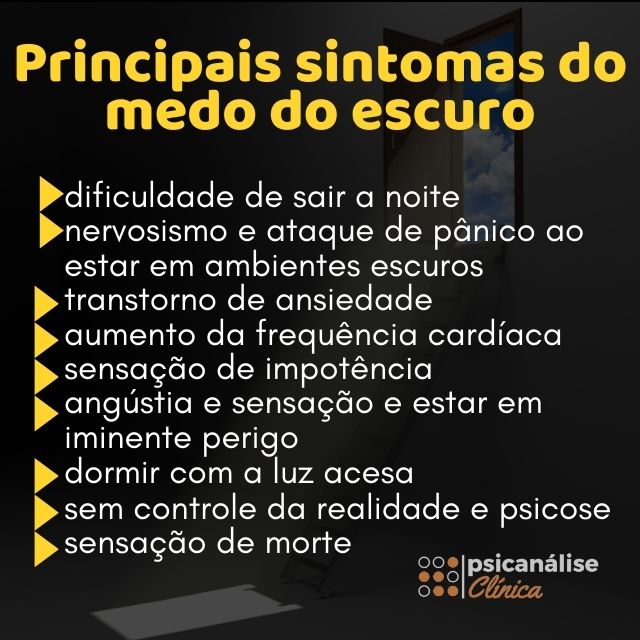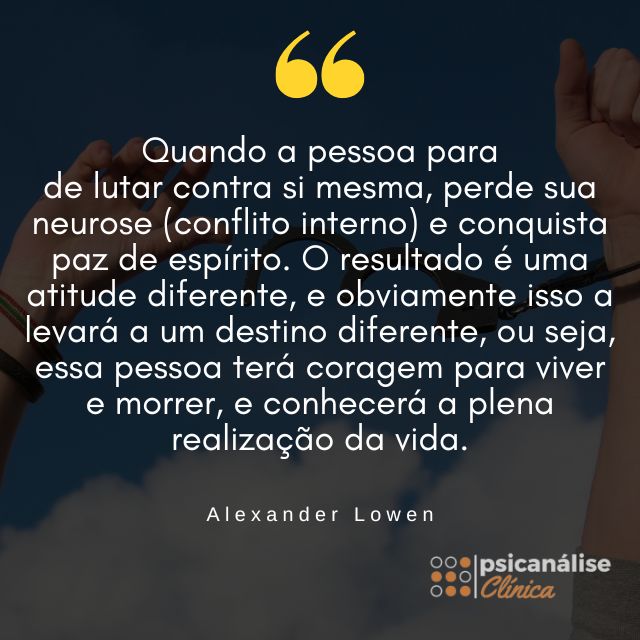Table of contents
O fear of the dark is usually triggered in children, however, it is possible for this fear to extend into adulthood. In this specific phobia the trigger happens when the person is in the dark and, from then on, they are terrified of what might happen or appear, or even of the anguish caused by not being able to see around them.
Darkness, basically, is what we experience when we are asleep, but for people who suffer from myctophobia the total absence of light becomes terrifying.
In short, phobias are characterized by an intense and irrational fear of something or some situation, to the point that it becomes paralyzing, so much so that it begins to condition the person's life, as they avoid the phobic stimulus at all costs.
What are phobias?
Fears are common to all people, as they are part of our life self-preservation mechanism, it is our brain's way of showing that we are in the midst of a dangerous situation and must defend ourselves.
However, these common fears become phobias when their motivators are hyperdimensional. The person feels an unreasonable fear, without being in any risky situation. In other words, the phobias are mental disorders, in which the person lives in a state of alertness even if there is no sign of risk to your life.
Most people who suffer from phobias cannot recognize that they are facing a disorder of the mind, and refuse to seek help from a specialized professional. Thus, they spend their lives avoiding a certain thing or situation, causing them various problems and traumatic situations.
Beforehand, understand that it is essential for our fears to be understood, and then to have the courage to face them, and, if we cannot, to encourage us to act against our neurotic fears.

What is mycthophobia, nicthophobia, ligophobia, scotophobia, or acluophobia?
Darkness phobia, also called mycphobia, nictophobia, ligophobia, scotophobia, or acluophobia, is characterized by fear of the dark This fear of the dark in an irrational way, in situations that could not possibly occur. makes one's life limited, suffering from anguish and anxiety simply for fear of the lack of light.
Fear of the dark usually begins to develop in childhood, where people believe it is something "normal" during a child's development. However, even during childhood, if the fear of the dark is excessive, affecting daily life and sleep, it is necessary to seek psychological help.
See_also: Solitude and Loneliness: Differences in the Dictionary and in PsychologyWhat are the causes of dark phobia?
Most people associate fear of the dark with fear of being alone, so, for example, they can't sleep alone, but with people they are close to, such as parents or partners. However, this fear of the dark is a phobia, characterized as an anxiety disorder.
The dark phobia may not be directly related to the dark itself, but to the danger it presents in the phobic's imagination. That is, the night, the dark, brings the perception that something bad will always happen, the person sees it as something to be feared, mainly because of the feeling of uncertainty.
There are several causes for fear of the dark, such as, for example, the theory that this fear comes from the beginning of human evolution. Because, when there were no ways to produce light, darkness was a danger, because the person would be more vulnerable to predators. In this sense, this would be a genetic response for people who suffer from fear of the dark.
Another cause for this phobia would be some traumatic experience of the person in relation to the dark. For example, in childhood, as a form of punishment, being left in a dark environment. Or, worse, childhood traumas that occurred in the dark For example, sexual abuse, domestic violence, a car accident in the dark.
These are just a few examples of causes of fear of the dark, after all, our mind is extremely complex, and discovering the causes of a phobia may require treatment with a mental health specialist, who, through therapy, in an individualized way, will be able to understand the mind and the causes of fear of the dark.
Read Also: Androphobia: fear or phobia of menSymptoms of myctophobia
The symptoms of myctophobia, fear of the dark This disorder causes symptoms that can even disrupt the phobic's daily life. main symptoms of this phobia are:
I want information to enroll in the Psychoanalysis Course .
- difficulty in going out at night;
- Nervousness and panic attacks when being in dark surroundings;
- anxiety disorder;
- uncomfortable feeling;
- nausea;
- tremors;
- headache;
- increased heart rate;
- feeling of powerlessness in the face of darkness;
- anguish and a feeling of being in imminent danger;
- sleep with the light on;
- no reality control and psychosis;
- feeling of death.
Relationship of fear of the dark and sleep disorders
Mycophobia can be related to some sleep disorder, such as insomnia, for example. Studies show that most people who suffer from insomnia are afraid of the dark.
People who suffer from this phobia make the evening the beginning of moments of terror. The fear is excessive to such an extent that the person cannot perform tasks at night, and that includes sleeping peacefully. For, for the phobic, the night is the time when he/she is most in danger and thus cannot "let his/her guard down".
See_also: Fear of Confined Places: Symptoms and Treatments
Treatments for fear of the dark
People often live with their phobia without seeking professional help. This can happen because they are unaware of the disease, or even because they are embarrassed to expose their condition. In any case, living with this disease can only aggravate it, triggering even more serious mental disorders.
In this sense, if you suffer from fear of the dark or know someone who has this disorder, know that it is necessary seek help from a mental health professional For example, in therapy sessions, it will be possible to find the causes of the phobia and thus find a cure.
As, for example, in therapy sessions with a psychoanalyst, he will search for the causes of the phobia using techniques to access your unconscious mind. Thus, by bringing the information transmitted to your conscious mind, you will be able to bring effective solutions to your treatment.
It is worth pointing out that our unconscious mind, through its own language, reproduces our experiences and memories, which are responsible for the development of our personality. Hence the importance of the cause of fear through the unconscious mind, where you will be able, at the root, to find the solution to your disorder.
In parallel, if the phobic condition is at high levels of seriousness, it is also necessary to seek medical help, where a psychiatrist will be able to prescribe medication such as antidepressants and anxiolytics.
Want to know more about the causes of phobias?
However, you should know that the human mind is complex and mysterious, and if you have come to the end of this article you may want to know more about the human psyche and how phobias develop:
- Improve Self-Knowledge: The experience of psychoanalysis, is able to provide the student and the patient/client with insights into themselves that would be virtually impossible to obtain on their own;
- Improve interpersonal relationships: Understanding how the mind works can lead to better relationships with family and work members. The course is a tool that helps the student to understand other people's thoughts, feelings, emotions, pains, desires, and motivations.
Finally, if you enjoyed this content, please like and share it on your social networks. This will encourage us to continue producing quality content for our readers.
